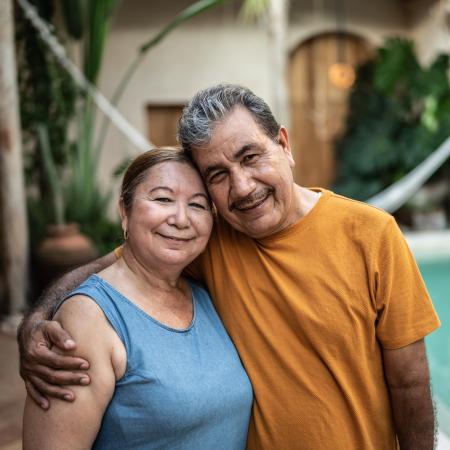At Pfizer, we are working every day to make our clinical trials more inclusive. We have made a commitment to design clinical trials so that enrollment reflects the diversity of the people affected by the different cancers we intend to treat and prevent. When you or a loved one choose to participate in a clinical trial, you are helping to build a greater understanding of your cancer type and bringing hope to all people living with cancer.
Today, over 7,000 people are participating in a Pfizer clinical trial for cancer.
When you participate in a clinical trial, you offer hope for your community, future generations, and yourself. We invite you to explore Pfizer's cancer clinical trials below. Hope starts here.
Explore our cancer clinical trials
Pfizer has clinical trials for adults and children in over 20 cancer types. Select from the list below to view clinical trials that are looking for participants.
Featured clinical trials enrolling now
Together, we can advance breakthroughs for all


Frequently Asked Questions
Our fight against cancer is not limited to advanced cancer. It is against all stages of cancer. Often, we research a study medicine in advanced cancer first. Then, if clinical trials show that the study medicine is safe and effective in advanced cancer, we next research it in earlier stages of cancer.
Yes. However, in a cancer study, participants who receive the placebo also receive the current ‘standard of care’ for their cancer. Standard of care is the established treatment that is used for a condition, and is incorporated into the design of the study.
We learn about the efficacy and safety of the study medicine by comparing the experiences of the participants who receive the study medicine with those who receive the placebo as well as the current standard of care for their cancer.
It depends on whether your oncologist is on the clinical study team. As part of a clinical trial, your study-related medical care is provided by the study team at the location where you’re participating. This includes the principal investigator (study doctor) — the healthcare professional who conducts and takes responsibility for the study at that location — as well as other study team members.
During your clinical trial, you may also continue to see your regular medical doctors for any care that is not related to the study. It is important for you to tell your study team about other conditions you might have, and to let them know which other doctors are caring for you. This helps the study team coordinate your overall care. It is equally important to tell your other doctors about your participation in your study.
What happens in a clinical trial depends on the ‘protocol.’ A protocol is a detailed plan that explains the purpose of the clinical trial and how it will be run. If you consider joining a clinical trial, these details will be explained to you as part of the informed consent process. They include:
- the length of the clinical trial
- the study medicines, procedures, and tests in the clinical trial
- the schedule of study activities
- information about who can participate
- how side effects will be tracked, managed, and reported
- the rules that must be followed
A clinical trial may also have aspects such as randomization, placebo, or blinding.
We encourage everybody to consider joining clinical trials. There are many types of clinical trials that study different aspects of health in people with a variety of backgrounds and conditions. Each clinical trial has its own criteria for who may participate. These are called eligibility criteria.
Eligibility criteria include things like your age, sex, overall health, type of condition, and your medical treatment history. As part of the steps to join a clinical trial, the study doctor will confirm whether you meet all eligibility criteria and are able to participate.
Participation in a clinical trial is always voluntary. The decision to join is personal, and it is yours.
To learn more about Pfizer’s clinical trials, visit Our Research or search for trials here.
We list all of our clinical trials that are recruiting participants or plan to recruit shortly in our Find a Trial search engine. We welcome you to explore our clinical trials and the information provided about each study. There is contact information available on each study’s webpage.
For general inquiries about Pfizer clinical trials, you may call 1-800-887-7002 or email [email protected].
Our Find a Trial search engine only provides information about Pfizer clinical trials. To search for all registered clinical trials, regardless of the study sponsor, you may visit ClinicalTrials.gov.




